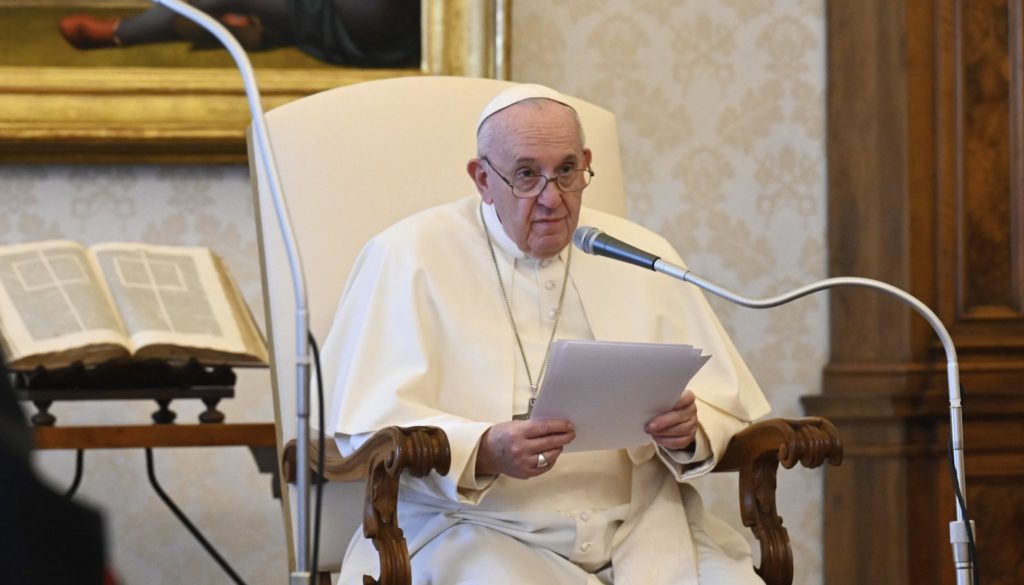Pope Francis focused today's catechesis on a form of prayer: meditation. "For a Christian to "meditate" is to seek a synthesis," the Pope affirmed. "It means to place oneself before the great page of Revelation in order to try to make it our own, assuming it completely. And the Christian, after having received the Word of God, does not keep it closed within himself, because that Word must encounter "another book", that the Catechism calls "the one of life" (cfr. Catechism of the Catholic Church, 2706). This is what we try to do every time we meditate on the Word".
A widespread practice
Francis reflected on the general practice of meditation, which is widespread today among people of other religions as well, even among people who do not have a religious vision of life. "We all need to meditate, to reflect, to find ourselves again." "Above all," the Pontiff continued, "in the voracious Western world, meditation is sought after because it represents a high embankment against daily stress and the emptiness that spreads everywhere."
We all need to meditate, to reflect, to find ourselves again.
Pope Francis’General Audience, April 28, 2021
"There is, therefore, the image of young people and adults sitting in recollection, in silence, with their eyes half closed... What are these people doing? They meditate. It is a phenomenon to be looked at with good eyes: in fact we are not made to run ahead, we have an inner life that cannot always be trampled on. Meditating is therefore a necessity for everyone".
Jesus Christ is the door to prayer
"But we realize that this word, once accepted in a Christian context, assumes a specificity that must not be cancelled. The great door through which the prayer of a baptized person passes - we remind you once again - is Jesus Christ. The practice of meditation also follows this path. The Christian, when he prays, does not aspire to full transparency of self, he does not set out in search of the deepest core of his self; the Christian's prayer is above all an encounter with the Other with a capital O. If an experience of prayer gives us inner peace, or self-mastery, or lucidity about the path to take, these results are, so to speak, collateral effects of the grace of Christian prayer, which is the encounter with Jesus".
If an experience of prayer gives us inner peace, it is the result of the grace of Christian prayer, which is the encounter with Jesus.
Pope Francis’General Audience, April 28, 2021
The term "meditation" throughout history has had different meanings. The Pope affirms that "even within Christianity it refers to different spiritual experiences. Nevertheless, some common lines can be drawn, and in this we are also helped by the Catechism, which says: "The methods of meditation are as diverse as the spiritual masters are diverse. [But a method is only a guide; the important thing is to advance, with the Holy Spirit, along the one way of prayer: Christ Jesus" (n. 2707).
Forms of meditation
The Pope considered the variety of ways to meditate. There are many methods of Christian meditation: some are very sober, others more articulate; some emphasize the intellectual dimension of the person, others rather the affective and emotional. "All are important and worthy of being practiced, insofar as they can help the experience of faith to become a total act of the person: it is not only the mind of man who prays, just as it is not only his feelings that pray. In ancient times they used to say that the organ of prayer is the heart, and thus they explained that it is the whole man, starting from his center, that enters into relationship with God, and not only some of his faculties".
The method is a path, not a goal
Francis wanted to remind and encourage us not to forget "that the method is a way, not a goal: any method of prayer, if it wants to be Christian, is part of this method. sequela Christi which is the essence of our faith. The Catechism specifies: "Meditation involves thought, imagination, emotion and desire. This mobilization is necessary to deepen the convictions of faith, to arouse conversion of heart and to strengthen the will to follow Christ. Christian prayer is preferably applied to meditating on 'the mysteries of Christ'" (n. 2708).
The grace of Christian prayer
"This is therefore the grace of Christian prayer," the Pope affirmed: "Christ is not far away, but is always in relationship with us. There is no aspect of his divine-human person that cannot become for us a place of salvation and happiness. Every moment of Jesus' earthly life, through the grace of prayer, can become contemporary for us. Thanks to the Holy Spirit, we too are present at the Jordan River when Jesus is immersed in it to receive baptism. We too are guests at the wedding feast of Cana, when Jesus gives the most good wine for the happiness of the spouses".
Christ is not far away, but is always in relationship with us.
Pope Francis’General Audience, April 28, 2021
In conclusion, the Holy Father empathized with our personal situation: "We too are amazed at the millions of healings performed by the Master. And in prayer we are the cleansed leper, blind Bartimaeus who recovers his sight, Lazarus who comes out of the tomb... There is no page of the Gospel in which there is no place for us. Meditating, for us Christians, is a way of encountering Jesus. And in this way, and only in this way, we can find ourselves again".








